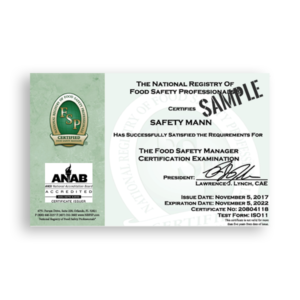Certified Food Manager Certification: What You Need to Know
Certified Food Manager Certification: What You Need to Know
Blog Article
How to Get Your Food Supervisor Accreditation Rapidly
Acquiring your Food Supervisor Accreditation successfully needs a methodical method, starting with a complete understanding of the particular demands in your location. Several people ignore essential aspects that can even more expedite this process, which may dramatically affect their qualification trip.
Research Certification Demands

Ambitious food supervisors ought to initially recognize which certifications are acknowledged and requisite in their territory. This usually entails examining neighborhood laws and policies that dictate food security techniques and the credentials needed for managerial positions. Moreover, recognizing the qualification standards, such as prior experience in food service or associated fields, is crucial.

Choose a Reliable Training Program
Picking the ideal training program is a vital action after identifying the qualification requirements in your location. The effectiveness of your training can dramatically influence your understanding of food safety and security principles, which are necessary for passing the certification test. Begin by researching programs recognized by respectable companies, such as the American National Criteria Institute (ANSI), as these typically comply with sector standards.
Think about the training style that ideal matches your understanding style. Evaluate the educational program to guarantee it covers crucial subjects such as foodborne ailments, hygiene, and secure food handling practices.
Look for reviews and reviews from previous participants to evaluate the program's efficiency. Furthermore, ask about the certifications of the trainers, as skilled fitness instructors can offer important insights. Finally, confirm that the program consists of thorough materials and sources to assist in your understanding (Certified Food Manager Certification). By thoroughly selecting a training program that straightens with your demands, you can improve your preparation for the food manager qualification examination.

Prepare for the Test

Make use of research products that line up with the examination's framework. Numerous organizations offer research overviews and technique examinations, which can be vital in assessing your understanding and readiness. Take part in active understanding strategies, such as flashcards or seminar, to enhance retention of critical details.
In addition, think about going to review training courses or workshops that give thorough protection of important subjects. These sessions usually include expert understandings that can clear up complex principles and strengthen your knowledge.
Arrange Your Examination Date
Picking the ideal time to schedule your test day is a critical action in the qualification process. Picking an appropriate date permits you to designate adequate time for prep work while stabilizing various other Bonuses personal and webpage specialist commitments. Consider your present work and any forthcoming events that might distract you from concentrated study.
Purpose to schedule your test after completing your primary coursework and practice tests. This guarantees you feel great in your knowledge and abilities. In addition, think about arranging your exam for a day when you are commonly at your most alert and concentrated, as psychological clarity can substantially impact performance.
It is additionally a good idea to inspect the schedule of exam slots in your location, as some places may have limited openings. Scheduling your test well beforehand can assist you safeguard a preferred time and location. Be aware of the certification's expiration policies, as selecting a day also much in the future might lead to a lapse in your knowledge.
Ultimately, the goal is to discover an equilibrium in between preparedness and schedule, guaranteeing you approach your test with self-confidence and a strong structure of expertise.
Maintain Your Certification
Maintaining your certification is important for making sure continuous skills and conformity in food administration methods. Accreditation commonly calls for revival every 3 to 5 years, depending upon the providing company. To stay present, it is essential to understand the specific renewal needs of your qualification body, as they might differ.
Proceeding education and learning is an i was reading this essential component of keeping your accreditation (Certified Food Manager Certification). Taking part in workshops, workshops, or on-line courses associated with food security, hygiene, and monitoring methods not just improves your expertise however might also accomplish renewal needs. Additionally, lots of certification organizations supply resources and training sessions to assist you stay notified concerning the current sector standards and guidelines
Exercising good food administration within your office is equally vital. Frequently using your expertise and skills strengthens your capability and may offer paperwork that shows adherence to best practices.
Finally, monitor your qualification's expiration date and any type of needed documents for the revival procedure - Certified Food Manager Certification. Proactively taking care of these components will ensure that you preserve your accreditation without interruption, enabling you to proceed giving effective and safe food management in your professional environment
Conclusion
Achieving Food Manager Certification efficiently necessitates a tactical method that includes extensive research study of regional requirements, selection of an appropriate training program, and diligent prep work for the exam. Prompt organizing of the examination complying with completion of training is crucial to avoid unneeded hold-ups. Furthermore, staying informed concerning revival demands guarantees the maintenance of qualification condition. By adhering to these outlined actions, people can successfully browse the qualification process and enhance their specialist credentials in food management.
The course to acquiring food supervisor accreditation is not consistent; it differs dramatically depending on regional guidelines and the specific qualification program chosen. The efficiency of your training can significantly influence your understanding of food safety and security principles, which are crucial for passing the certification examination. By carefully choosing a training program that straightens with your needs, you can improve your prep work for the food manager accreditation test.
Thorough preparation is crucial for success on the food manager accreditation test.Attaining Food Manager Accreditation effectively demands a strategic method that consists of thorough research of regional demands, choice of an ideal training program, and diligent preparation for the evaluation.
Report this page